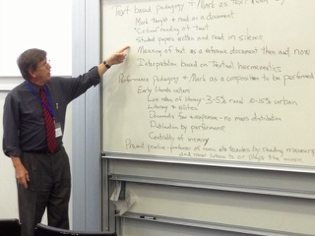Messiah of Peace featured on “Faith Matters” blog
December started off with good news: The Messiah of Peace will be featured on Bill Tammeus’ “Faith Matters” blog on Thursday, December 3. Bill is the former Faith section columnist for The Kansas City Star and past president of the National Society of Newspaper Columnists. The Messiah of Peace is Tom’s recently published performance criticism commentary on Jesus’ passion and resurrection story according to Mark.
Click here to read the feature on The Messiah of Peace(Dec. 3 or later)
Click here to visit The Messiah of Peace website
Click here to order the book from Wipf & Stock Publishers
Teaching Mark as Performance Literature
Early Literate and Post-Literate Pedagogies
The following is excerpted from a presentation by Tom Boomershine at the International Society of Biblical Literature meeting in St. Andrews, Scotland, 2013. The presentation will be published early next year in a collection of essays on Markan pedagogy by scholars from around the world.
“The pedagogical methods for the teaching of biblical literature have been shaped by two underlying factors: the dominant communication culture of each successive period and the conception of the original character of the Bible. In effect, biblical professors have reconceived and taught the Bible in ways that are congruent with the dominant communication culture of their period in history and with their conception of the Bible in its original historical context…
… The major shift involved in the teaching of Mark as performance literature is to reorient the experience of Mark from silent reading of the text to embodied performance. When seen from a pedagogical perspective, our present practices would be analogous to a professor of piano who taught students to study the manuscripts of the piano compositions of Bach, Beethoven, and Brahms and never played the music or taught the students to perform it. At every stage of the course work, experience of Mark as sound and as stories told to audiences is foundational. The possibilities range from weekly assignments and classroom experience to individual and communal research projects. The more the pedagogical approaches of the course pursue a multi-faceted exploration of Mark as stories told by heart to audiences, the better will be the overall course experience. The presupposition of teaching Mark in this manner is that students will learn more about the character and meaning of Mark by being actively engaged in learning and telling the composition.”
The title of Tom’s chapter is “Teaching Mark as Performance Literature: Pre-Literate and Post-Literate Pedagogies” in Communication, Pedagogy, and the Gospel of Mark, edited by Elizabeth Shiveley.
SBL 2015: Pedagogy Workshop in Atlanta
Speaking of pedagogy and the Society of Biblical Literature (SBL), I recently had the privilege of sharing my pedagogical approaches with a group of college and seminary teachers. For the fourth year in a row, the Bible in Ancient and Modern Media program unit sponsored a session at the annual SBL meeting, held this year in Atlanta, called “Using Performance to Teach the Bible/Orality, Memory, Performance Criticism, and Related Disciplines.”
I demonstrated several of the basic processes I use in teaching a biblical story from the learn-listen-connect-tell workshop model. My demo story was “Cleansing a Leper” (Mark 1:40-45). With experiences earlier in the month teaching that story to women in jail and men in prison fresh in my mind, I led the group through “RAM (repeat-after-me), Word I Heard, Storyboard, Tell to a Partner, Listen to the Story in Its Original Context, and a brief introduction to Connections. Then each participant told the story to a small group.
Addressing a room full of academics was a first for me. Learning and telling a biblical story more or less verbatim was probably a first for many of them. I was satisfied: they participated as well as the women in jail and the men in prison-which is saying a lot. And everybody learned a great story.
The Proof Is in the Pudding: Evaluating the Pedagogy
The following two surveys from individuals in a program that uses pedagogical methods advocated by GoTell show that at least for some folk the methods have positive results. Both surveys were taken following the same class in November, one by a person who had attended before, and the other by a newcomer. The words at the top are cards from the “Word I Heard” storylearning activity. The surveys are shown with permission.



